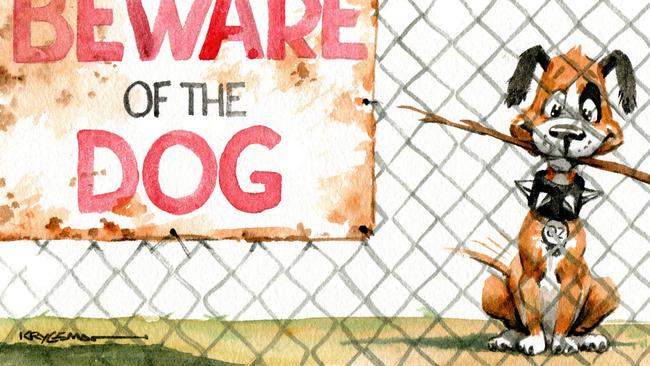
THERE was more bad news for the harmony industry last week with the publication of the 2014 Social Cohesion survey.
Once again it appears Australians are rubbing along nicely and the social fabric is in remarkably good shape. If the Scanlon Foundation’s survey is accurate, the nation’s anti-discrimination professionals can look forward to another year of thumb twiddling.
Australia, as many of its inhabitants suspected, is one of the happiest places on the planet.
The overwhelming majority of Australians — 92 per cent — feel a sense of belonging. Nine out of 10 express pride in the Australian way of life. Eight out of 10 think this is a land of opportunity. Eight in 10 think ethnic diversity has been good for Australia. Six in 10 think the immigration level is about right or could be higher. “This is possibly the highest level of positive sentiment towards immigration in the Western world,” says Andrew Markus, the author.
The proportion of Australians unhappy with the official immigration policy is less than half that of Spain (77 per cent), Greece (73 per cent), Britain (73 per cent) and the US (71 per cent).
On the face of it, the Scanlon survey provides little support for the theory that Australians are irredeemably racist folk who live in mortal fear of “the other”.
The failure of Australians to conform to this character assessment has been a continual source of frustration to the proclaimed experts. The absence of disharmony, like the absence of a rise in global surface temperatures for the past 15 years or so, challenges deeply held assumptions.
The search for the missing intolerance, like the search for the missing heat, leads the experts to present ever more convoluted theories. Since there is no evidence of institutional racism, we are told to be wary of “casual racism”, petty linguistic crimes that few of us are clever enough to be aware we are committing.
Complexity, of course, is the technocrat’s friend. Complex problems demand complex solutions, or so we are often told. Stand aside, madam and sir. We’ll let the professionals handle this one.
“There is no simple way to solve complex human rights issues,” last year’s Human Rights Commission report says. “That is why the commission uses a range of integrated approaches, while also focusing on particular areas of discrimination through our specialised commissioners.”
Tim Soutphommasane is a commissioner who specialises in race. Last week he told the ACT Legislative Assembly that multiculturalism was “an ongoing project” that “requires constant effort and it demands our vigilance”.
Some Australians might find it disconcerting to hear multiculturalism described as “a project”, as if it were somehow an end in itself. The “project”, if we call it that, is surely to increase the prosperity of Australia by encouraging the best and brightest to settle here, regardless of where they came from.
The argument for the abolition of the White Australia policy put by Donald Horne in The Lucky Country a half-century ago still rings true: “Australians may be more capable of effective policies of live-and-let-live — whatever nonsense they talk in their bars and sitting rooms — than some may give them credit for.”
If we assume the aim of the Human Rights Commission is to strengthen social cohesion, its work is, at best, unnecessary. At worst, the policies it has supported recently have made Australia a more divided, less happy place.
Human Rights Commission president Gillian Trigg and her predecessor Cathy Branson have stridently opposed the detention of asylum-seekers. Yet the quasi-open borders policy they support would undermine community support for immigration, leading to greater division and tension on this sensitive social issue.
The Scanlon survey suggests the ability of the government to control the borders is directly linked to acceptance of the immigration policy more broadly. When the number of authorised arrivals by boat increased under Labor, support for immigration declined. Last year the proportion of the population that thought the level of migration was too high rose to 42 per cent. This year it has fallen seven points to 35 per cent.
Social cohesion is further threatened by the commission’s fetish for diversity. The active promotion of difference makes it harder to recognise shared values, patriotic identification and trust.
In his speech last week as reported by The Canberra Times, Soutphommasane continued his critique of the term “Team Australia”.
“I think it is only fair that we ask what Team Australia must mean,” Soutphommasane said. “We should remember as well that patriotism or a love of country is something that isn’t always worn on your sleeve and isn’t something that is always expressed explicitly.
“It is not something that you have to express every day, overtly, or beat your chest about. You can be a lot more humble, you can be quieter, and in many ways it is more powerful that way as well.”
Soutphommasane is a philosopher by training, which may explain why he feels compelled to overcomplicate the matter. No one is advocating the thumping of chests, or compulsory green and gold face painting and flag-raising ceremonies.
The qualification for membership of Team Australia may simply come down to the ability to fit in. Shared values, rather than self-conscious, sponsored diversity, is the essence of social cohesion.
The Scanlon survey’s results are encouraging. We have a shared vision, common values and mutual respect. Our institutions are generally respected and almost everyone thinks the system is fair. Active democratic participation is high by world standards, even if we don’t think much of our politicians.
Nick Cater is executive director of the Menzies Research Centre.


